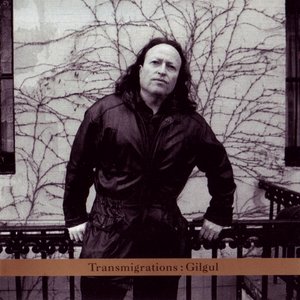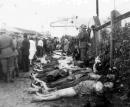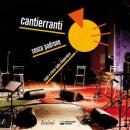יעדער רופֿט מיך זשאַמעלע.
אײַ, װי מיר איז שװער!
כ'האָב געהאַט אַ מאַמעלע,
כ'האָב זי שױן נישט מער.
כ'האָב געהאַט אַ טאַטעלע,
האָט ער מיך געהיט,
איצט בין איך אַ שמאַטעלע
װײַל איך בין אַ ייׅד.
כ'האָב געהאַט אַ שװעסטערל,
איז זי מער נישטאָ.
אײַ װוּ ביסטו אסתּרל
אין דער שװערער שעה?
ערגעץ בײַ אַ בױמעלע,
ערגעץ בױַ אַ פּלױט
כיגט מײַן ברודער שלומהלע
פֿון אַ דײַטש געטױט.
כ'האָב געהאַט אַ הײמעלע,
איצטער איז מיר שלעכט.
כ'בין װי אַ בעל־חײמעלע
װאָס דער תּלין שעכט.
אַך, דו גאָט אין הימל,
קוק אױף דער ערד אַראָפּ.
זע נאָר װי דײַן בלימל
שנײַדט דער תּלין אָפּ.
אײַ, װי מיר איז שװער!
כ'האָב געהאַט אַ מאַמעלע,
כ'האָב זי שױן נישט מער.
כ'האָב געהאַט אַ טאַטעלע,
האָט ער מיך געהיט,
איצט בין איך אַ שמאַטעלע
װײַל איך בין אַ ייׅד.
כ'האָב געהאַט אַ שװעסטערל,
איז זי מער נישטאָ.
אײַ װוּ ביסטו אסתּרל
אין דער שװערער שעה?
ערגעץ בײַ אַ בױמעלע,
ערגעץ בױַ אַ פּלױט
כיגט מײַן ברודער שלומהלע
פֿון אַ דײַטש געטױט.
כ'האָב געהאַט אַ הײמעלע,
איצטער איז מיר שלעכט.
כ'בין װי אַ בעל־חײמעלע
װאָס דער תּלין שעכט.
אַך, דו גאָט אין הימל,
קוק אױף דער ערד אַראָפּ.
זע נאָר װי דײַן בלימל
שנײַדט דער תּלין אָפּ.
Contributed by Bartleby + CCG/AWS Staff - 2011/4/14 - 09:47
Language: Yiddish
La trascrizione in caratteri latini.
Un caso frequente nella Sezione Yiddish di questo sito: il testo qua inserito è leggermente diverso da quello trascritto presente generalmente in Rete. Questo perché, per le ritrascrizioni in caratteri ebraici, i testi sono stati davvero e letteralmente controllati parola per parola. [RV]
YEDER RUFT MIKH ZHAMELE
Yeder ruft mikh Zhamele.
Ay, vi mir iz shver!
Kh’hob gehat a mamele,
Kh’hob zi shoyn nisht mer.
Kh’hob gehat a tatele,
Hot er mikh gehit,
Itst bin ikh a shmatele
Vayl ikh bin a yid.
Kh’hob gehat a shvesterl,
Iz zi mer nishto.
Ay vu bistu Esterl
In der shverer sho?
Ergets by a boymele,
Ergets bay a ployt
Ligt mayn bruder Shloymele
Fun a daytsh getoyt.
Kh’hob gehat a heymele,
Itster iz mir shlekht.
Kh’ bin vi a bal-heymele
Vos der talyen shekht.
Akh, du Got in himl,
Kuk af der erd arop.
Zey nor vi dayn bliml
Shnaydt der talyen op.
Yeder ruft mikh Zhamele.
Ay, vi mir iz shver!
Kh’hob gehat a mamele,
Kh’hob zi shoyn nisht mer.
Kh’hob gehat a tatele,
Hot er mikh gehit,
Itst bin ikh a shmatele
Vayl ikh bin a yid.
Kh’hob gehat a shvesterl,
Iz zi mer nishto.
Ay vu bistu Esterl
In der shverer sho?
Ergets by a boymele,
Ergets bay a ployt
Ligt mayn bruder Shloymele
Fun a daytsh getoyt.
Kh’hob gehat a heymele,
Itster iz mir shlekht.
Kh’ bin vi a bal-heymele
Vos der talyen shekht.
Akh, du Got in himl,
Kuk af der erd arop.
Zey nor vi dayn bliml
Shnaydt der talyen op.
Contributed by Bartleby - 2013/6/5 - 00:01
Language: English
Traduzione inglese dalle note al disco di Krakowski “Transmigrations: Gilgul” pubblicate sul sito dell’etichetta Kame'a.


EVERYONE CALLS ME ZHAMELE
Everyone calls me Zhamele.
Ay, things are really tough!
I once had a dear mother.
I don’t have her anymore.
I once had a dear father
Who took care of me.
Now I’m like a little rag
Because I am a Jew.
I once had a little sister.
She is no longer here.
Ay, where are you Esther, dear,
In these difficult times?
Somewhere near a little tree,
Somewhere near a hedge
Lies my brother Shloymele,
Murdered by a German.
I once had a little home,
Now things are bad for me.
I am like a little animal
That the hangman slaughters.
Oh, God in Heaven,
Look down upon the earth.
See how the hangman
Cuts down your little flower.
Everyone calls me Zhamele.
Ay, things are really tough!
I once had a dear mother.
I don’t have her anymore.
I once had a dear father
Who took care of me.
Now I’m like a little rag
Because I am a Jew.
I once had a little sister.
She is no longer here.
Ay, where are you Esther, dear,
In these difficult times?
Somewhere near a little tree,
Somewhere near a hedge
Lies my brother Shloymele,
Murdered by a German.
I once had a little home,
Now things are bad for me.
I am like a little animal
That the hangman slaughters.
Oh, God in Heaven,
Look down upon the earth.
See how the hangman
Cuts down your little flower.
Contributed by Bartleby - 2011/4/14 - 09:48
Language: Italian
Traduzione italiana di Claudio Canal dal suo libro intitolato “Tutti mi chiamano Ziamele: musiche yiddish", Giuntina, 1990.
Questa versione italiana è stata messa in musica per coro e violino da un astigiano che si cela dietro lo pseudonimo di Cinnamologus ed eseguita in occasione della Giornata della Memoria 2010 dal coro "Laeti Cantores" di Canelli diretto dal M° Orietta Lanero.
Questa versione italiana è stata messa in musica per coro e violino da un astigiano che si cela dietro lo pseudonimo di Cinnamologus ed eseguita in occasione della Giornata della Memoria 2010 dal coro "Laeti Cantores" di Canelli diretto dal M° Orietta Lanero.
TUTTI MI CHIAMANO ZIAMELE
Tutti mi chiamano Ziamele.
Ay, come è difficile.
Avevo una mammina,
Adesso non c’è più.
Avevo un paparino,
Era pieno di cure per me.
Ora sono uno straccetto,
Perché sono un ebreo.
Avevo una sorella,
Non c’è più.
Ah, Esther, dove sei,
In quest’ora sempre più difficile?
Da qualche parte vicino ad un piccolo albero,
Da qualche parte per terra,
Giace mio fratello, Shloymele.
Ucciso da un soldato.
Avevo una piccola casa,
Ma i tempi ora sono cattivi.
Sono come un vitello
Nel recinto di un macellaio.
Dio, tu che guardi dal cielo
Sulla terra,
Guarda ai tuoi piccoli
Mietuti e appesi.
Tutti mi chiamano Ziamele.
Ay, come è difficile.
Avevo una mammina,
Adesso non c’è più.
Avevo un paparino,
Era pieno di cure per me.
Ora sono uno straccetto,
Perché sono un ebreo.
Avevo una sorella,
Non c’è più.
Ah, Esther, dove sei,
In quest’ora sempre più difficile?
Da qualche parte vicino ad un piccolo albero,
Da qualche parte per terra,
Giace mio fratello, Shloymele.
Ucciso da un soldato.
Avevo una piccola casa,
Ma i tempi ora sono cattivi.
Sono come un vitello
Nel recinto di un macellaio.
Dio, tu che guardi dal cielo
Sulla terra,
Guarda ai tuoi piccoli
Mietuti e appesi.
Contributed by Bartleby - 2011/4/14 - 09:49
In questo (unico) caso, per questa canzone di testo anonimo e musicata da Bernardo Feuer, viene lasciata l'attribuzione a Wolf Krakowski. Un po' perché è l'unico interprete kletzmer che ha scritto una volta a questo sito, e un po' (tanto) perché ci sta simpatico. A volte può funzionare anche così...
CCG/AWS Staff - 2013/6/4 - 23:59
Greetings:
In the interests of accuracy, the CD cover displayed here is the Tzadik Records re-issue (2001) of my CD "TRANSMIGRATIONS: GILGUL." The original Kame'a Media edition (released 1996) can be seen here: www.kamea.com . FYI.
WIth best wishes
Wolf Krakowski
Northampton, MA
In the interests of accuracy, the CD cover displayed here is the Tzadik Records re-issue (2001) of my CD "TRANSMIGRATIONS: GILGUL." The original Kame'a Media edition (released 1996) can be seen here: www.kamea.com . FYI.
WIth best wishes
Wolf Krakowski
Northampton, MA
Wolf Krakowski - 2013/7/7 - 01:23
×
![]()
Note for non-Italian users: Sorry, though the interface of this website is translated into English, most commentaries and biographies are in Italian and/or in other languages like French, German, Spanish, Russian etc.




[1945]
Testo di autore anonimo.
Musica di Bernardo Feuer (1910-1967), musicista originario di Leopoli (Lwów in polacco, L’viv in ucraino), una delle città dell’Europa centro-orientale che maggiormente subirono gli orrori della guerra, vedendo alternarsi l’occupazione sovietica a quella nazista per poi essere inglobata all’URSS nel 1945. Bernardo Feuer scampò all’Olocausto perché già negli anni 20 emigrò in Argentina, dove fu protagonista della vita culturale della locale comunità ebraica fondando anche una celebre gruppo corale, il coro Hazamir.
Secondo le scarne informazioni reperibili su Music and Holocaust questa straziante canzone veniva intonata da un ragazzino ebreo ospitato in un orfanotrofio di Lublino, avendo perso l’intera sua famiglia nei campi di sterminio nazisti. Altre fonti invece danno il ghetto ebraico di Kowno (Kaunas, in Lituania) come il luogo originario del brano.
Wolf Krakowski, musicista di origine polacca nato nel 1947 in Austria in un “DP camp”, uno dei tanti campi profughi allestiti alla fine della guerra per dare assistenza ai sopravvissuti, ne ha offerta una sua interpretazione nell’album intitolato “Transmigrations: Gilgul” (edito nel 1996 dall’etichetta Kame'a Media e ripubblicato nel 2001 dalla Tzadik Records) nel quale sono incluse anche ! בלײַב געזונט מיר, קראָקע e װאַרשע.
Altre esecuzioni del brano si trovano in “Ruth Rubin.Yiddish Songs of The Holocaust” e in “Voices Of The Ghetto. Warszawa, 1943”.